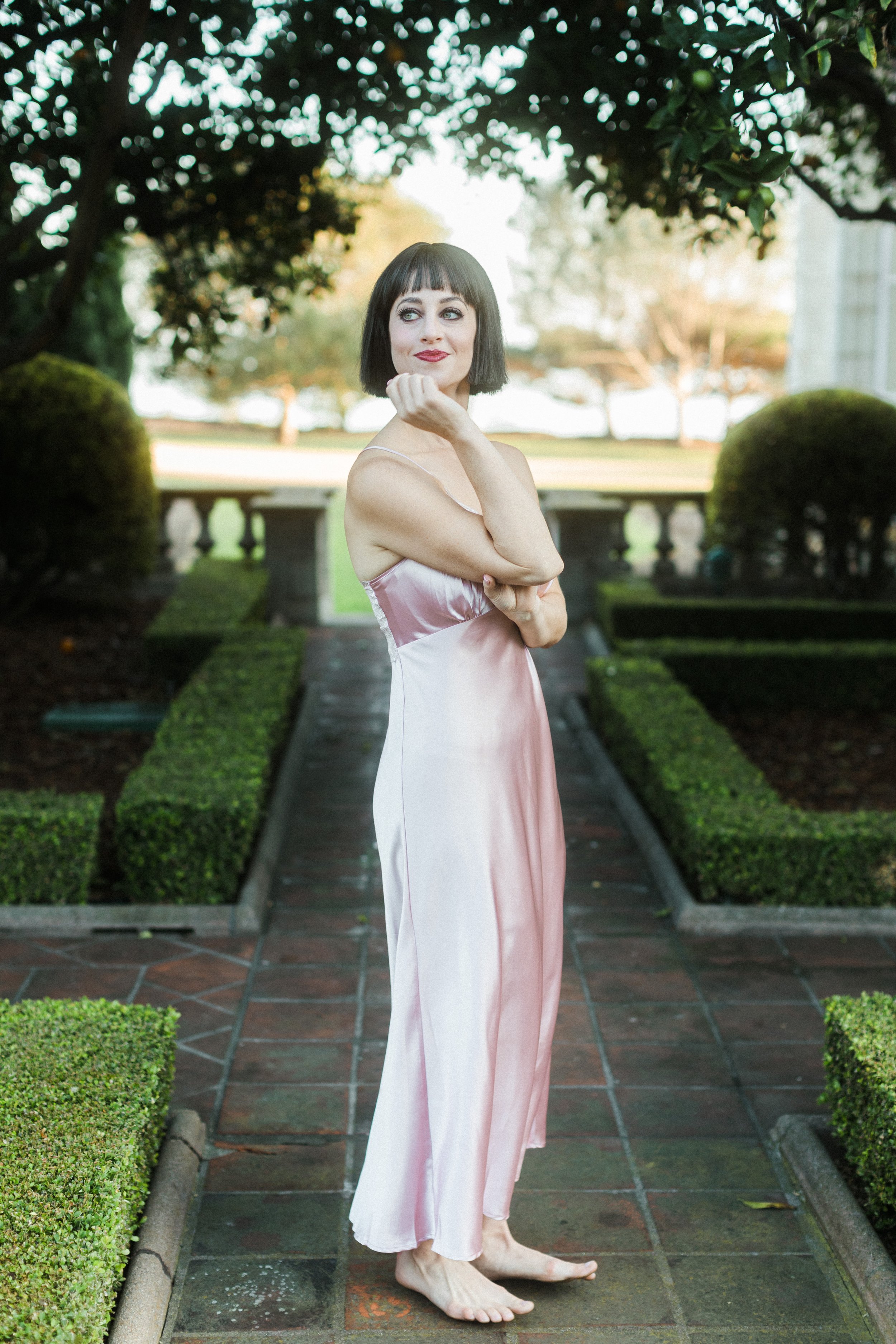"...As the brazen Sofronia, McIntyre was mesmerizing with blazing coloratura and a secure, even trill. Later, as the sensuous but penniless actress, Norina, she won Ernesto's heart as well as an enormous cacophony of honking horns and blinking lights for her solo bow."
— Maria Nockin, Broadway World Review
“Soprano Jana McIntyre sang an electrifying Norina, easily commanding the venue’s giant video screens and car radios with a ravishing tone and an absorbing physical presence.”
— Charles Doneland, The Independent
“These were the backgrounds for star and minor‑star personae… But Jana McIntyre as the opera star/wife and faux wife of the old man, has more than a few roles to play. Richard Strauss obviously needed a soprano who could reach her high C’s, could shout, scream, whisper. Listening to her was a joy of surprises. Her supposed marriage was both sympathetic and beautiful.”
— Harry Rolnick, ConcertoNet
”Jana McIntyre’s glittery coloratura… sounded warm and accurate. Graceful on stage, she skillfully conveyed the reluctance Aminta felt in engaging in the marital deception.”
— David Shengold, Opera News
“Surprisingly the biggest voices seemed to belong to singers who played small parts – ie, Jana McIntyre as the shepherd boy…”
- Neil Kurtzman, Opera and Medicine
“The evening’s finale sparkled with the technique and comic abandon required by Rossini’s Le Comte Ory. Soprano Jana McIntyre (Santa Barbara, CA) engaged in a tug of war for vocal supremacy, with Josh Lovell playing the title character. Let’s call it a draw. Both drew hearty cheers from the audience and they were equally charming, even if McIntyre’s agility was truly breathtaking.”
— Philip Campbell, The Bay Area Reporter
“the terrific cast, including Jana McIntyre, who, as Henry’s wife Aminta and Morosus’s faux wife Timidia, is the fulcrum of the plot as well as an incredibly skilled and lovely singer and actress. While Morosus may want her to be RUHE, we can never get enough of her.”
— Seth Rogovy, Opera Review
“Jana McIntyre combined a dancer’s grace, mercurial wit and a vibrant soprano tone."
- David J. Baker, Opera News
“Jana McIntyre dispatches Aminta’s many high notes with aplomb”
— George Loomis, Financial Times
“La Serva Padrona,' is all laughs, and the duo of soprano Jana McIntyre... conveyed the piece’s charms seamlessly. McIntyre dispatched her assignment with a silvery sheen (all while contending bravely with recalcitrant sets and props) into a performance of comic bravura... zinging, trilled “r’s” of soprano Jana McIntyre as a saucy and domineering maid... the sheer firepower and finesse of the singing carried the night. "
— Steven Winn, San Francisco Classical Voice
“Standouts were... Jana McIntrye, whose sensational, always musically phrased Queen of the Night exceeded many”
— David Shengold, Gay City News
“Not to be outdone, the Queen of the Night (Jana McIntyre), delivers a performance filled with the stuff of great nightmares — complete with 6-inch talons on her fingers that she flexes with serious wicked intent. McIntyre’s vocal gymnastics are performed with effortless ease. Her signature second act aria is breathtakingly brilliant.”
— Wayne F. Anthony, The Blade
“Soprano Jana McIntyre did not disappoint, offering a dazzling upper register with pin-point control in “O zittre nicht”. The even more difficult “Der hölle Rache” featured a flittering, glittering set of ringing high Fs. This was an impressive run through this show-stopping number.”
— Paul J. Pelkonen, Superconductor, Culture Magazine
"The Gluck was a much more straightforward affair. Joining Costanzo in the endeavor were soprano Kiera Duffy as Euridice, soprano Jana McIntyre as Amore... Both sopranos demonstrated fine, healthy voices—adept and flexible and rigorously exact. "
- Patrick Clement James, Parterre Box
“But the reason this Semele so often soared was largely due to Jana McIntyre in the title role. McIntyre’s tone was clear, complete with lustre and bloom in her top notes. The coloratura passages were tight and her English diction was such that you didn’t miss a word. What’s more, she may have a petite build, but she’s big on what used to be called ‘moxie,’ which made her perfect in this update, complete with Louise Brooks bob. She sang “Myself I shall adore” from her bed, wielding her mirror as if she were using a smartphone camera to post photos to social media.”
- James C. Taylor, Opera Magazine
“The real discovery of the night was soprano Jana McIntyre, an enchanting Zerlina with a lovely light soprano that emphasized the character’s youth and naiveté”
— Jonathan Pell, Opera News
“Aminta is a Zerbinetta-like role, wildly high with staccato, and Jana McIntyre is tireless, filled with charm. The expected edge in her very top serves the situation well. Her love duet with Portillo, which she concluded on an endless pianissimo high D flat (which Morosus repeats octaves below), was breathtaking.”
— Robert Levine, Bachtrack
“The bright-voiced soprano Jana McIntyre was wonderful as Annchen, Agathe’s sassy cousin.”
— Anthony Tommasini, The New York Times
"Jana McIntyre consumes the stage as Andromède. Her lovely voice, with a slight French accent, reaches high and low comfortably. The challenges of the role are not perceptible because McIntyre has thoroughly mastered difficulties and made them pleasures."
— Susan Hall, Berkshire Fine Arts
“Jana McIntyre, the Queen of the Night, was virtuosic, all confidence and clarity; hers… the finest performance”
- John Kissane, Revue
“Jana McIntyre nailed the Queen of the Night’s two arias and, even more impressively, looked like she was having fun doing it.”
— Joanne Sydney Lessner, Opera News
“In La Scala di Seta (The Silk Ladder), our heroine, Giulia (the radiant Santa Barbara–bred Jana McIntyre, in magnificent voice and sharply comic-timed form), is a young love-finagling schemer rather than a tortured soul.”
- Josef Woodard, The Independent
“Bubbling coloratura and crystal-clear high notes marked soprano Jana McIntyre’s ‘Care compagne’ from Bellini’s La Sonnambula. McIntyre gave one of the most polished performances of the evening, and her innate sense of style was evidenced in both her musicianship and the chic yellow gown that she wore.”
— Rick Perdian, Seen and Heard International
"…The third shrewd move of Opera Santa Barbara, was engaging the soprano Jana McIntyre, a 29 year-old Santa Barbara native who was making her company debut as Norina. Here was a reminder that a single standout vocal performance can make other production flaws seem to disappear.”
— James C. Taylor, Opera Magazine
“As Semele, Jana McIntyre provided the wheel of musical fire around which the action spun. Her duets with her sister, Ino; her lover, Jupiter; and her disguised rival, Juno, were consistently brilliant, and her several spectacular arias brought down the house.”
— Charles Donalen, Santa Barbara Independent
“Jana McIntyre sings with a bright, earnest lyric voice”
— Oussama Zahr, The New York Times
“Jana McIntyre blends earthiness and innocence in a sweetly endearing Zerlina, as in the way she teasingly ministers to a badly beaten Masetto in “Vedrai carino,”
- James D. Watts, The Tulsa World
“Here the young woman, Serpina, was coquettishly sung by Jana McIntyre, who possesses exquisite vocal technique, great acting ability, and a soprano voice that will take her far. Jana McIntyre is definitely a singer to watch! …as superb in their roles as one could ever hope to hear.”
- James Roy MacBean, The Berkeley Daily Planet




